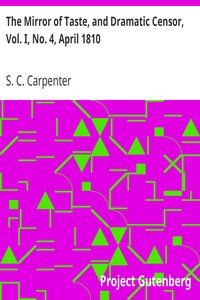The Mirror of Taste, and Dramatic Censor, Vol. I, No. 4, April 1810 by Carpenter
"The Mirror of Taste, and Dramatic Censor, Vol. I, No. 4, April 1810" by Carpenter is a collection of theatrical essays and critiques written in the early 19th century. The publication explores the history of drama, particularly the origins of comedy and its relation to tragedy, while engaging in philosophical discussions on the nature of human enjoyment in both genres. The opening of this installment delves into the origins of comedy, tracing
its evolution from ancient Greek performance to its relationship with tragedy. It discusses notable figures such as Aristophanes and Socrates, detailing how the comedic genre often served to examine human flaws through ridicule, while questioning why audiences find pleasure in witnessing the follies of others. Additionally, it presents a critical view of how comedy has transformed over time, indicating a moral purpose behind its humor while reflecting on the societal impacts of such representations. (This is an automatically generated summary.)
Read now or download (free!)
| Choose how to read this book | Url | Size | ||||
|---|---|---|---|---|---|---|
| Read online (web) | https://sendtokindle.compellingsciencefiction.com/ebooks/26954.html.images | 320 kB | ||||
| EPUB3 (E-readers incl. Send-to-Kindle) | https://sendtokindle.compellingsciencefiction.com/ebooks/26954.epub3.images | 216 kB |
Send
to kindle email: |
|||
| EPUB (older E-readers) | https://sendtokindle.compellingsciencefiction.com/ebooks/26954.epub.images | 217 kB | ||||
| EPUB (no images, older E-readers) | https://sendtokindle.compellingsciencefiction.com/ebooks/26954.epub.noimages | 191 kB | ||||
| Kindle | https://sendtokindle.compellingsciencefiction.com/ebooks/26954.kf8.images | 494 kB | ||||
| older Kindles | https://sendtokindle.compellingsciencefiction.com/ebooks/26954.kindle.images | 457 kB | ||||
| Plain Text UTF-8 | https://sendtokindle.compellingsciencefiction.com/ebooks/26954.txt.utf-8 | 279 kB | ||||
| Download HTML (zip) | https://www.gutenberg.org/cache/epub/26954/pg26954-h.zip | 207 kB | ||||
| There may be more files related to this item. | ||||||
Similar Books
About this eBook
| Editor | Carpenter, S. C. (Stephen Cullen), -1820? |
|---|---|
| Title | The Mirror of Taste, and Dramatic Censor, Vol. I, No. 4, April 1810 |
| Note | Reading ease score: 68.6 (8th & 9th grade). Neither easy nor difficult to read. |
| Credits |
Produced by Barbara Tozier, Bill Tozier, Josephine Paolucci
and the Online Distributed Proofreading Team at https: //www.pgdp.net. |
| Language | English |
| LoC Class | AP: General Works: Periodicals |
| Subject | Theater -- Periodicals |
| Subject | Drama -- Periodicals |
| Category | Text |
| EBook-No. | 26954 |
| Release Date | Oct 18, 2008 |
| Most Recently Updated | Jan 4, 2021 |
| Copyright Status | Public domain in the USA. |
| Downloads | 145 downloads in the last 30 days. |
| Project Gutenberg eBooks are always free! | |

